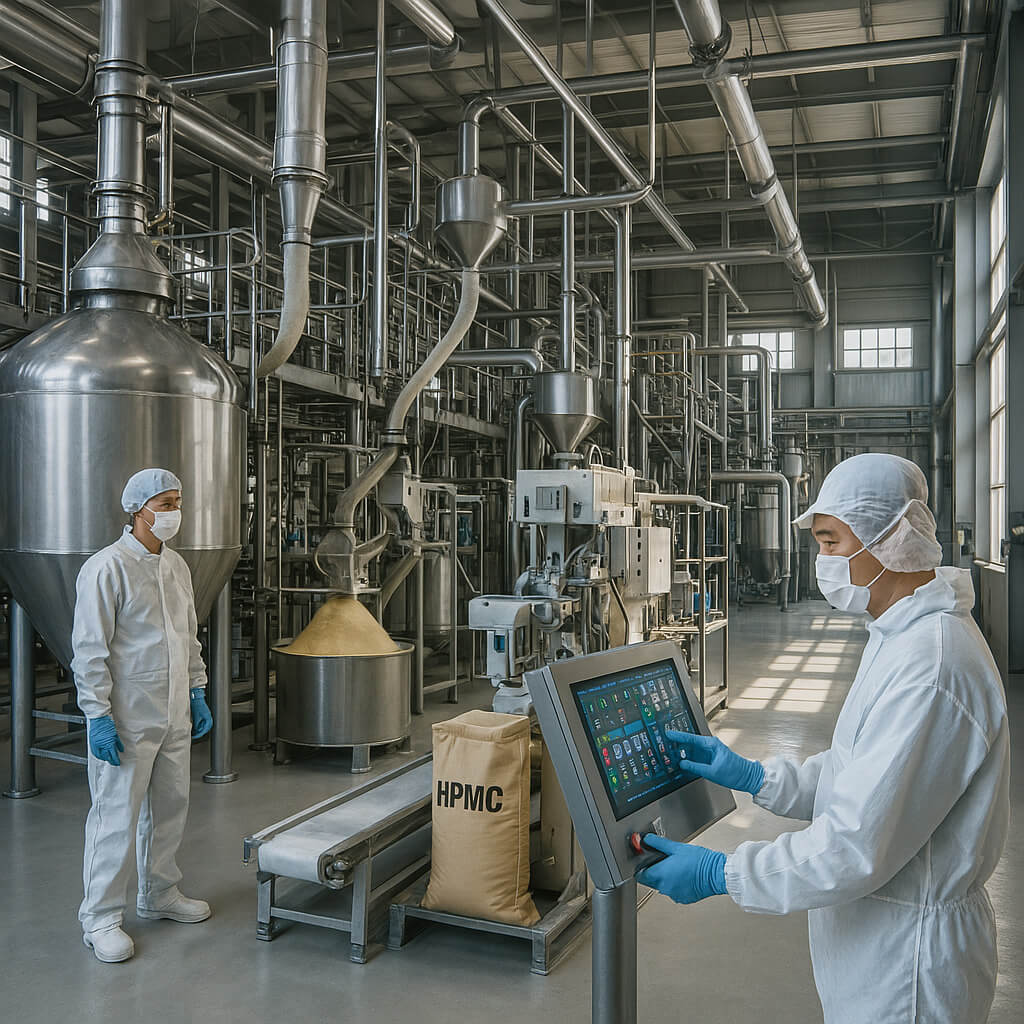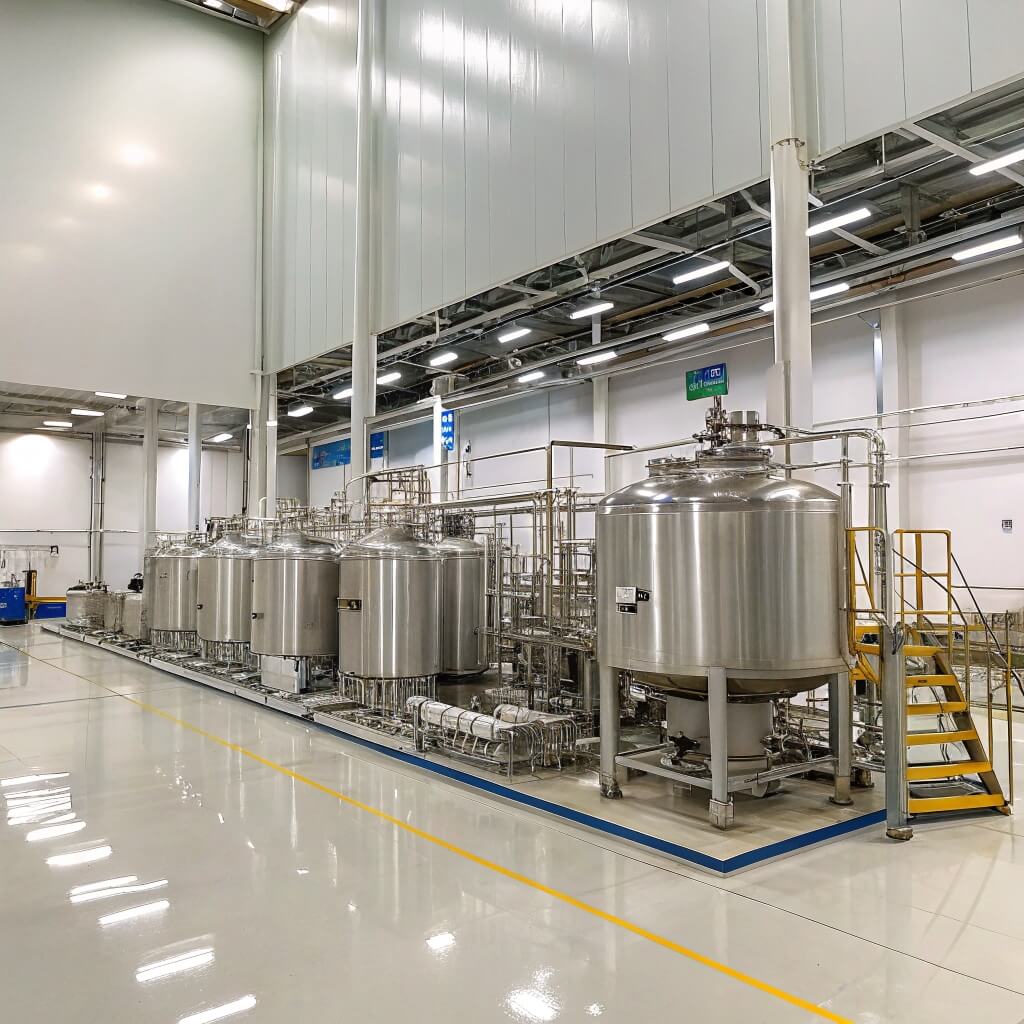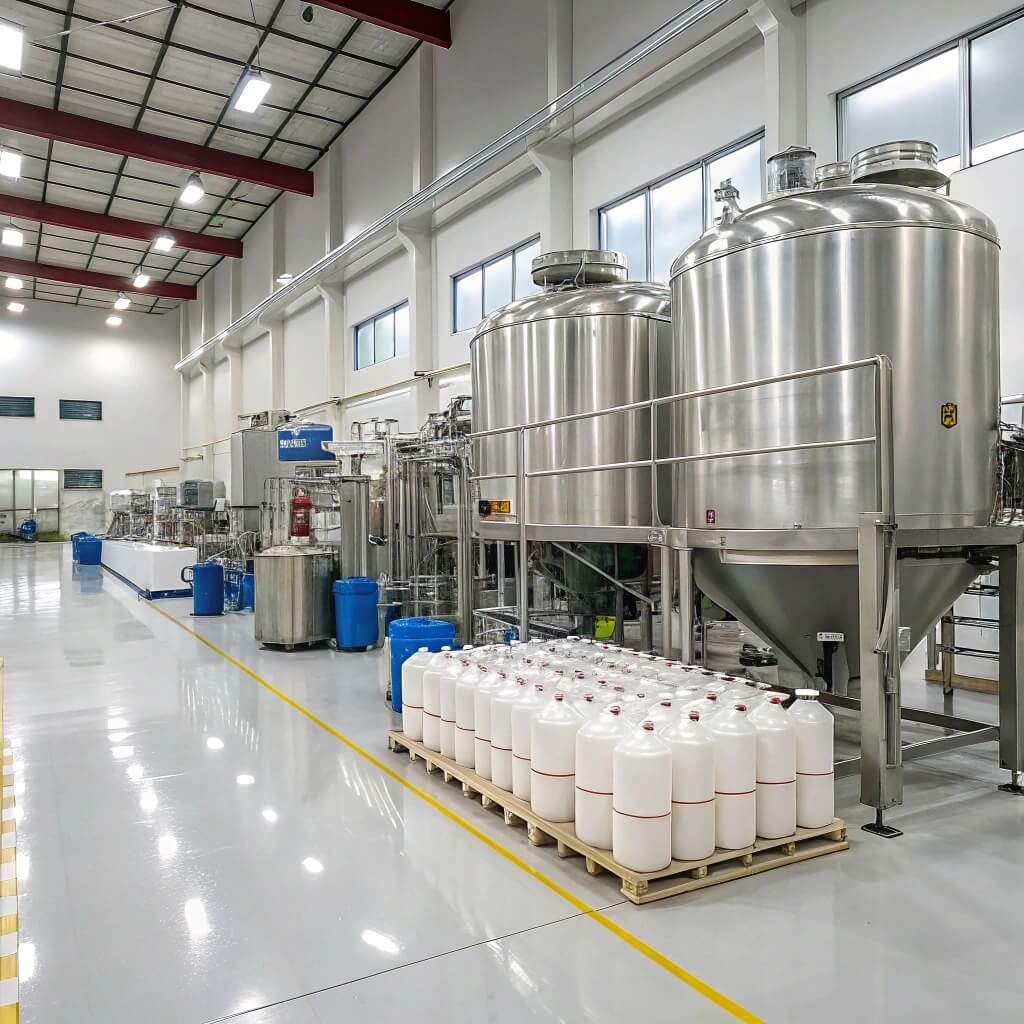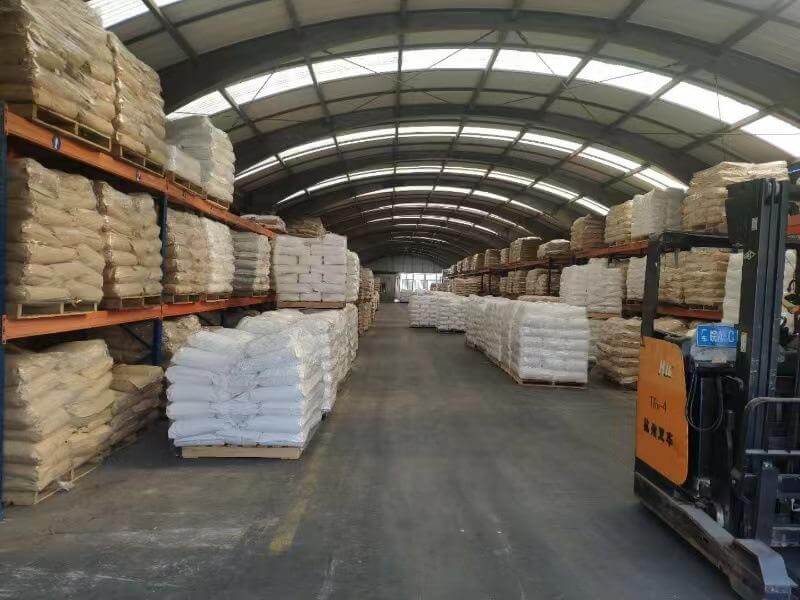Many industries rely on Hydroxypropylméthylcellulose (HPMC) for its thickening, stabilizing, and binding properties. However, not all HPMC is the same—quality and production methods vary by region, affecting performance and pricing.
China is the world’s largest producer of HPMC, supplying over 50% of the global market with high-quality, cost-effective products that meet international standards. With advanced manufacturing capabilities, strict quality control, and a well-integrated supply chain, China continues to dominate the industry.
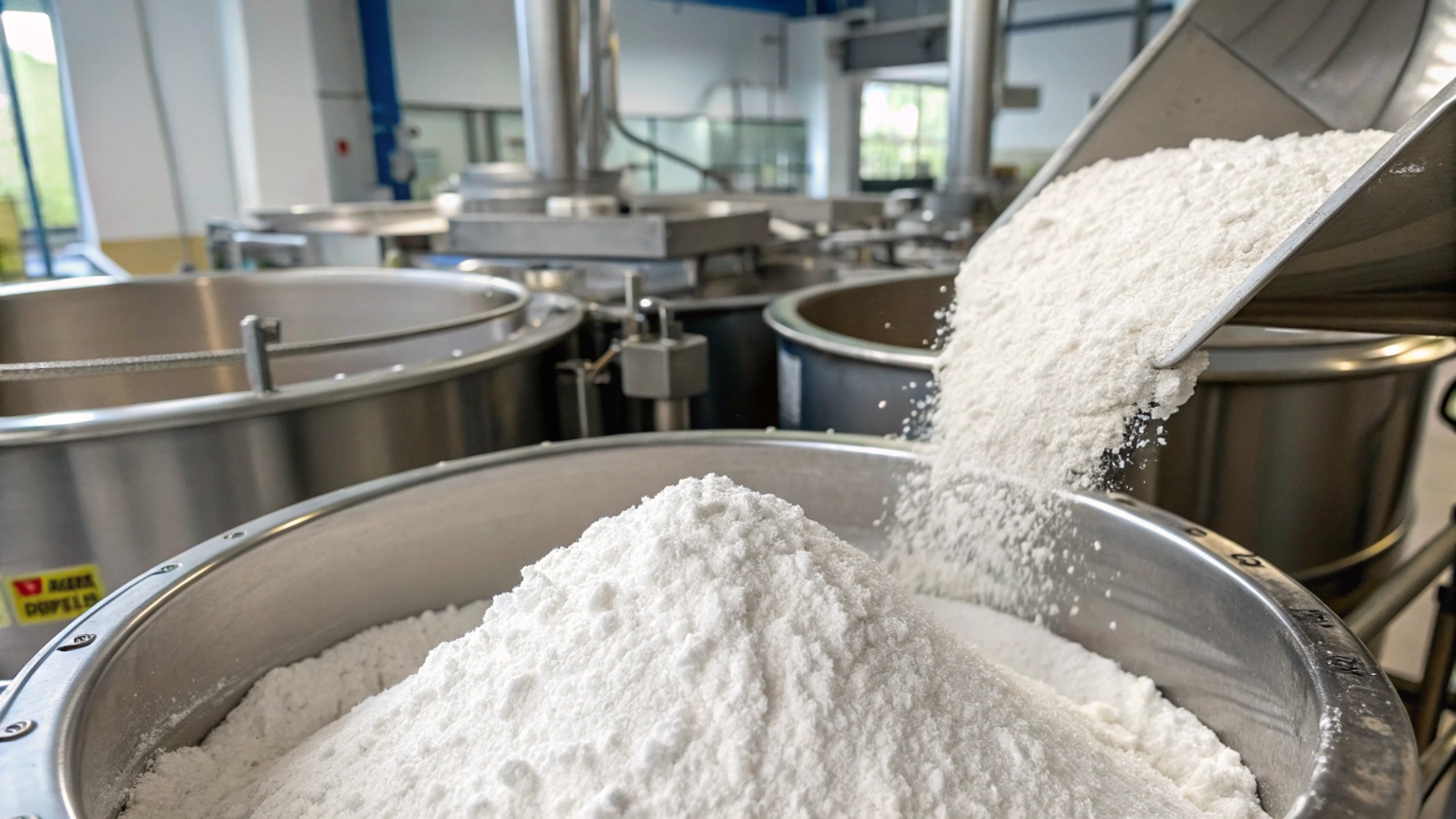
A visual representation of HPMC production, highlighting key applications in construction, pharmaceuticals, and food industries.
Compréhension what HPMC is, how it is manufactured, and why China leads global production is essential for businesses looking to source high-quality materials. Below, we break down the key aspects of HPMC production, applications, and supplier selection to help you make an informed decision.
What is HPMC and Why is it Important?
Hydroxypropylméthylcellulose (HPMC) is a widely used cellulose derivative known for its thickening, stabilizing, water-retention, and film-forming properties. It plays a crucial role in industries de la construction, des produits pharmaceutiques, de l'alimentation et des soins personnels, ensuring product consistency and performance.
HPMC is a water-soluble, non-ionic polymer that enhances adhesion, moisture control, and viscosity across various applications. Its ability to form protective films and maintain stability in different conditions makes it a preferred choice for industrial formulations.
1. Principales propriétés du HPMC
HPMC is valued for its functional versatility and chemical stability:
- Rétention d'eau – Prevents premature drying in cement-based materials and pharmaceutical formulations.
- Contrôle de la viscosité – Acts as a thickening agent in adhesives, coatings, and food products.
- Capacité filmogène – Provides protective coatings for tablets, waterproofing layers, and surface treatments.
- Stabilité du pH – Maintains consistent performance across acidic and alkaline environments.
| Propriété | Description |
|---|---|
| Solubilité | Dissolves in cold water, forming clear solutions |
| Gelation Temperature | 60-75°C, ideal for industrial and pharmaceutical use |
| Stabilité du pH | Functional across a wide pH range |
| Biodégradabilité | Derived from natural cellulose, environmentally friendly |
2. Why is HPMC Essential in Modern Industries?
HPMC enhances product durability, functionality, and efficiency, making it indispensable in:
- Construction materials – Utilisé dans tile adhesives, self-leveling compounds, and cement mortars to improve workability and water retention.
- Pharmaceutical formulations – Serves as a tablet binder, controlled-release excipient, and capsule film coating.
- Food products – Fonctionne comme un stabilizer and thickener in dairy, plant-based foods, and gluten-free formulations.
- Cosmetics and personal care – Améliore texture and moisture retention in lotions, shampoos, and creams.
3. How to Select the Right HPMC Grade
Différentes industries nécessitent specific HPMC grades, varying in viscosité, pureté et propriétés fonctionnelles. Selecting the right type ensures optimal performance and cost-effectiveness for your application.
HPMC est un critical additive for multiple industries, offrant enhanced stability, improved performance, and regulatory compliance. Ensuite, explorons how HPMC is manufactured and what factors impact its quality.
How is HPMC Manufactured?
Producing Hydroxypropylméthylcellulose (HPMC) requires advanced chemical processing to ensure purity, consistency, and performance across various applications. The manufacturing process impacts viscosity, solubility, and functionality, making it crucial for buyers to source from reliable suppliers.
HPMC is synthesized from natural cellulose through a series of etherification reactions, resulting in a water-soluble polymer with enhanced thickening and binding properties. The production process involves multiple stages, each contributing to the product’s final quality.
1. Step-by-Step HPMC Production Process
HPMC manufacturing consists of four key stages, ensuring chemical stability and uniform composition:
| Étape | Description |
|---|---|
| Step 1: Cellulose Selection & Preparation | Haute pureté pâte de bois ou linter de coton is cleaned and refined. |
| Step 2: Alkalization Process | Cellulose is treated with sodium hydroxide (NaOH) to activate reactive sites. |
| Step 3: Etherification Reaction | The alkalized cellulose reacts with methyl chloride (CH3Cl) and propylene oxide (C3H6O) présenter groupes hydroxypropyle et méthyle. |
| Step 4: Purification & Drying | Unreacted chemicals are removed, and the material is washed, dried, and ground into a fine powder. |
2. Key Factors Affecting HPMC Quality
The quality of HPMC depends on several factors, including:
- Pureté des matières premières – High-quality cellulose ensures low impurity levels and consistent performance.
- Reaction Control – Precise etherification improves viscosity stability and solubility.
- Filtration & Drying Techniques – Advanced filtration removes residual chemicals, while controlled drying prevents over-processing and quality degradation.
3. Types of HPMC Based on Production Variables
HPMC can be customized based on viscosity, substitution degree, and moisture content, influencing its application suitability.
| Type HPMC | Characteristics | Application |
|---|---|---|
| Low-Viscosity HPMC | Fast dissolution, lower thickening effect | Self-leveling compounds, coatings |
| Medium-Viscosity HPMC | Balanced flow and water retention | Tile adhesives, mortars, detergents |
| High-Viscosity HPMC | Strong gel formation, extended stability | Pharmaceutical coatings, food stabilizers |
4. Why Manufacturing Standards Matter
Reliable HPMC suppliers strictly control production variables maintenir batch consistency and regulatory compliance. Leading Chinese manufacturers adhere to ISO, USP, EP, and JP standards, assurant high-quality HPMC suitable for global markets.
Le HPMC manufacturing process directly affects product performance, making supplier selection a key factor for buyers. Next, let’s explore the main applications of HPMC across different industries.
What are the Main Applications of HPMC?
Hydroxypropylméthylcellulose (HPMC) is a multi-functional polymer used in construction, pharmaceuticals, food, cosmetics, and coatings. Its unique properties, such as water retention, thickening, film-forming, and binding capabilities, make it essential across various industries.
HPMC enhances product performance by improving consistency, stability, and adhesion, making it a key ingredient in high-performance industrial and consumer applications.
1. HPMC dans le secteur de la construction
L'HPMC est largement utilisé dans dry mix mortars, tile adhesives, and cement-based products, fournissant better workability and water retention.
| Application | Function of HPMC |
|---|---|
| Tile Adhesives & Grouts | Améliore adhesion, water retention, and open time for better workability. |
| Cement Plasters & Renders | Améliore cohesion, sag resistance, and application smoothness. |
| Composés autonivelants | Contrôles viscosity and prevents material segregation. |
| Gypsum-Based Products | Réduit cracking and increases spreadability. |
2. HPMC dans les produits pharmaceutiques
HPMC is a key excipient in tablet formulations and drug delivery systems, assurant stability, controlled release, and effective film-coating.
- Tablet Coatings & Binders – Agit comme un agent filmogène, s'améliorant tablet integrity and controlled drug release.
- Capsule Shells (Vegetarian Alternatives) – Utilisé dans gelatin-free capsule production for pharmaceuticals and supplements.
- Ophthalmic Formulations – Provides moisture retention in eye drops and artificial tears.
3. HPMC in Food & Personal Care
HPMC is approved as a food-grade thickener and stabilizer, commonly found in dairy products, sauces, plant-based foods, and cosmetics.
| Industrie | Fonction |
|---|---|
| Industrie alimentaire | Used as a stabilizer, emulsifier, and fat replacer dans les aliments transformés. |
| Dairy & Plant-Based Alternatives | Améliore texture and shelf stability dans non-dairy creams and vegan products. |
| Cosmetics & Skincare | Fournit thickening and moisture retention in lotions, shampoos, and creams. |
4. Other Industrial Applications
- Peintures et revêtements – Améliore viscosity and film durability in water-based coatings.
- Adhesives & Sealants – Améliore bonding strength and spreadability.
- Detergents & Cleaning Products – Agit comme un suspending agent in liquid formulations.
HPMC est un versatile, high-performance additive used across multiple industries, offering enhanced functionality and product stability. Next, let’s examine why China is a leading manufacturer of HPMC and how its industry has evolved.
Why is China a Leading Manufacturer of HPMC?
La Chine est la world’s largest producer of Hydroxypropyl Methylcellulose (HPMC), supplying over 50% of the global market. Many industries source Chinese HPMC for its quality, competitive pricing, and stable supply chains.
China leads in HPMC production due to large-scale manufacturing, advanced technology, cost efficiency, and compliance with international quality standards.
1. Large-Scale Production Capacity
Chinese manufacturers operate some of the largest cellulose ether production plants, assurant high output and bulk supply capabilities.
| Facteur | Chine | Autres régions |
|---|---|---|
| Part de marché mondiale | Over 50% | Smaller production scale |
| Efficacité de fabrication | High-volume, automated | Limited automation |
| Volume d'exportation | Largest in the industry | Lower international presence |
Avec industrial hubs and government-backed chemical manufacturing zones, China has an efficient supply chain and production network.
2. Technologie de fabrication avancée
Leading Chinese HPMC producers use automation, precision filtration, and viscosity control to enhance product consistency.
- Etherification Processing – Assure precise viscosity levels and product purity.
- High-Efficiency Filtration & Drying – Reduces impurities, improves solubility, and extends shelf life.
- Custom Formulation – Enables production of specialized pharmaceutical, food, and construction-grade HPMC.
3. Cost Efficiency & Competitive Pricing
la Chine integrated supply chain permet cost advantages over Western producers.
- Locally sourced raw materials reduce reliance on imports.
- Installations de production automatisées lower processing costs.
- Incitations gouvernementales support chemical industry growth.
| Facteur de coût | Chine | Marques occidentales |
|---|---|---|
| Coûts des matières premières | Inférieur | Plus haut |
| Labor & Production Costs | More efficient | More expensive |
| Prix du produit final | More affordable | Plus haut |
4. International Quality Standards Compliance
Reputable Chinese HPMC manufacturers meet global regulatory requirements, making their products suitable for high-end applications.
- Conformité USP, EP, JP ensures suitability for applications pharmaceutiques et alimentaires.
- ISO & GMP Standards garantie product purity and safe processing.
- REACH & FDA Registration enables global exports with regulatory approval.
5. Reliable Supply Chain & Export Capabilities
La Chine a strong export logistics, permettant stable supply and fast shipping worldwide.
- Major ports (Shanghai, Qingdao, Tianjin) ensure efficient global distribution.
- High production capacity prevents shortages and stabilizes pricing.
- Well-established freight networks reduce international shipping costs.
Why Businesses Choose Chinese HPMC
- Strict quality control and international compliance.
- High-volume production for stable supply.
- Advanced technology ensuring product consistency.
- Competitive pricing without compromising quality.
China remains the top choice for HPMC buyers worldwide, offrant cost-effective, high-performance solutions. Ensuite, explorons how to choose the right HPMC supplier from China.
How to Choose the Right HPMC Supplier from China?
Selecting the best Hydroxypropyl Methylcellulose (HPMC) supplier in China requires careful evaluation. Not all manufacturers offer the same level of quality, consistency, and service, so buyers must assess key factors before making a decision.
Reliable Chinese HPMC suppliers provide high-quality products, strict regulatory compliance, and stable logistics. Buyers should verify certifications, production capacity, and supply chain reliability to ensure long-term success.
1. Key Factors to Consider When Choosing a Supplier
| Critères | What to Check |
|---|---|
| Certifications | USP, EP, JP, ISO, GMP, REACH compliance |
| Capacité de production | Large-scale automated facilities with stable output |
| Contrôle de qualité | COA (Certificate of Analysis) and third-party testing |
| Export Experience | Proven track record in global markets |
| Logistics & Lead Times | Reliable shipping with predictable delivery schedules |
| Service client | Quick response times, technical assistance |
2. How to Verify an HPMC Supplier’s Quality?
- Check Regulatory Certifications – Assurer le respect des international pharmaceutical, food, and industrial standards.
- Request COA and Batch Testing Reports – Confirm viscosity, moisture content, and purity before bulk orders.
- Visit the Factory (or Conduct a Third-Party Audit) – Inspect production conditions and quality control systems.
- Assess Customer Feedback & Export History – Look for suppliers with consistent performance in international markets.
3. Comparing Direct Manufacturers vs. Trading Companies
Some buyers prefer working directly with Fabricants de HPMC, while others source from trading companies that consolidate products from multiple factories.
| Supplier Type | Pros | Cons |
|---|---|---|
| Direct Manufacturer | Lower prices, direct quality control | Higher MOQs, limited flexibility |
| Trading Company | Multiple sourcing options, flexible MOQs | Higher prices, indirect quality assurance |
Pour long-term partnerships and bulk purchases, direct manufacturers are preferred. Pour small trial orders or multi-product sourcing, trading companies may offer more flexibility.
4. Negotiating the Best Terms with an HPMC Supplier
- MOQ (Minimum Order Quantity): Negotiate based on your volume needs.
- Payment Terms: Secure transactions via LC (Lettre de crédit) ou TT (Virement télégraphique).
- Lead Time & Shipping Options: Confirmer FOB, CIF, or DDP terms to align with supply chain planning.
5. Common Mistakes to Avoid When Sourcing from China
- Choosing the lowest price without quality verification.
- Skipping batch testing before placing a large order.
- Ignoring logistics and shipping lead times.
- Overlooking supplier reliability and post-sale support.
UN good HPMC supplier offers quality assurance, global compliance, and long-term reliability. Next, let’s look at future trends in the HPMC market and how China’s role is evolving.
What are the Future Trends in the HPMC Market?
Le mondial Hydroxypropyl Methylcellulose (HPMC) market évolue rapidement, sous l'impulsion de rising demand, technological advancements, and increasing regulatory requirements. As industries seek higher performance and sustainable solutions, manufacturers must adapt to new trends shaping the future of HPMC production and supply.
China remains the dominant HPMC supplier, but shifting market dynamics and innovations in production technology are expected to reshape the industry.
1. Growing Demand in Key Industries
The demand for HPMC is increasing across industries de la construction, des produits pharmaceutiques, de l'alimentation et des soins personnels, avec higher expectations for quality, functionality, and sustainability.
| Industrie | Growth Factor |
|---|---|
| Construction | Expanding urbanization and infrastructure projects |
| Médicaments | Increased use in controlled-release drug formulations |
| Alimentation et boissons | Rising demand for plant-based and gluten-free products |
| Cosmétiques et soins personnels | Growing need for natural, biodegradable ingredients |
2. Advancements in HPMC Manufacturing
Innovations in production technology and formulation are leading to more efficient and specialized HPMC grades.
- Improved Purification Techniques – Reduces impuretés et métaux lourds, making HPMC safer for applications pharmaceutiques et alimentaires.
- Custom Formulations for Specific Applications – Tailored HPMC products with optimized viscosity, water retention, and solubility.
- Automatisation dans la fabrication – Améliore batch consistency and scalability for global supply.
3. Shift Towards Sustainable and Eco-Friendly HPMC
Sustainability is becoming a key driver in the HPMC market, influencing both raw material sourcing and production processes.
- Biodegradable & Plant-Based Alternatives – Increased focus on renewable sources for cellulose ether production.
- Energy-Efficient Manufacturing – Adoption of low-emission processing techniques to reduce carbon footprint.
- Regulatory Pressure on Chemical Usage – Stricter compliance with EU REACH, FDA, and global environmental standards.
4. Market Expansion & Competitive Landscape
While China dominates HPMC production, new entrants from India, Europe, and North America are increasing competition.
| Région | Market Position |
|---|---|
| Chine | Leading supplier, high production efficiency |
| Inde | Growing presence, cost-competitive but variable quality |
| Europe & USA | Focused on high-purity, specialty HPMC |
To maintain its market leadership, Chinese HPMC manufacturers are investing in advanced R&D, sustainability initiatives, and global compliance certifications.
5. Ce que cela signifie pour les acheteurs
- Greater product variety and improved performance options.
- More focus on environmentally friendly and regulatory-compliant products.
- Increased competition leading to stable pricing and enhanced quality.
Le HPMC market is shifting towards higher performance, sustainability, and regulatory compliance, assurant better options for global buyers. Next, let’s summarize why Chinese HPMC remains the best sourcing choice.
Conclusion: Why HPMC from China is the Best Choice
Le Hydroxypropyl Methylcellulose (HPMC) market continues to expand, with increasing demand for high-quality, cost-effective, and reliable products. While multiple countries produce HPMC, China remains the preferred sourcing destination en raison de son advanced manufacturing capabilities, competitive pricing, and strict quality standards.
Principales raisons de s'approvisionner en HPMC en Chine
- Industry-Leading Production – China supplies plus de 50% du marché mondial du HPMC, ensuring stable and high-volume availability.
- Advanced Technology & Quality Control – Leading manufacturers follow USP, EP, JP, ISO, and GMP standards, guaranteeing batch consistency and regulatory compliance.
- Cost-Effective Without Compromising Quality – China’s efficient supply chain and lower production costs offer competitive pricing while maintaining high performance and purity.
- Reliable Logistics & Global Export Capability – Established shipping networks ensure fast lead times and stable supply chains for international buyers.
- Personnalisation et support technique – De nombreux fournisseurs proposent specialized HPMC grades tailored to specific industrial needs, offering better formulation flexibility.
Making the Right Sourcing Decision
Pour les entreprises qui cherchent à secure a long-term, high-quality HPMC supply, China remains the best option. However, choosing the right supplier is essential to avoid inconsistencies in quality and logistics.
By partnering with verified and reputable Chinese HPMC manufacturers, buyers gain access to superior quality, cost savings, and reliable supply chains, assurant successful procurement and product performance.
For businesses interested in high-quality HPMC sourcing from China, contact us to explore supplier recommendations and customized solutions tailored to your industry needs.
FAQ
Qui est le fabricant de HPMC ?
Several companies manufacture Hydroxypropylméthylcellulose (HPMC) globally, with China leading the market. Major Chinese manufacturers include Shandong Head Co., Ltd., LOTTE Fine Chemicals, Ashland China, Shin-Etsu (opérations en Chine) et Morton. These manufacturers produce HPMC for construction, pharmaceuticals, food, and industrial applications, adhering to USP, EP, JP, ISO, and GMP standards.
Qui est le fournisseur de HPMC en Chine ?
La Chine compte de nombreux Fournisseurs de HPMC, ranging from direct manufacturers to trading companies. Top suppliers include Shandong Head, Kima Chemical, Meihua, and Morton, connus pour leur high-quality products, regulatory compliance, and global export experienceLes acheteurs doivent vérifier supplier certifications, production capabilities, and customer feedback before purchasing.
What does HPMC do?
HPMC is a multifunctional polymer utilisé comme un thickener, stabilizer, film-former, and water retention agent in various industries:
- Construction – Améliore workability, adhesion, and durability in tile adhesives, cement mortars, and self-leveling compounds.
- Médicaments – Agit comme un tablet binder, controlled-release agent, and capsule film-coating excipient.
- Industrie alimentaire – Fonctionne comme un stabilizer and texture enhancer in dairy products, sauces, and plant-based alternatives.
- Cosmétiques et soins personnels – Améliore moisture retention and consistency in lotions, shampoos, and creams.
Le HPMC est-il approuvé par la FDA ?
Oui, HPMC is recognized as safe by the U.S. Food and Drug Administration (FDA) à utiliser dans applications pharmaceutiques et alimentaires. It is listed as an inactive ingredient in many FDA-approved medications and is permitted in food formulations as a thickener and stabilizer. Manufacturers producing food- and pharma-grade HPMC doit se conformer à FDA, USP, and GMP regulations to meet export standards.

